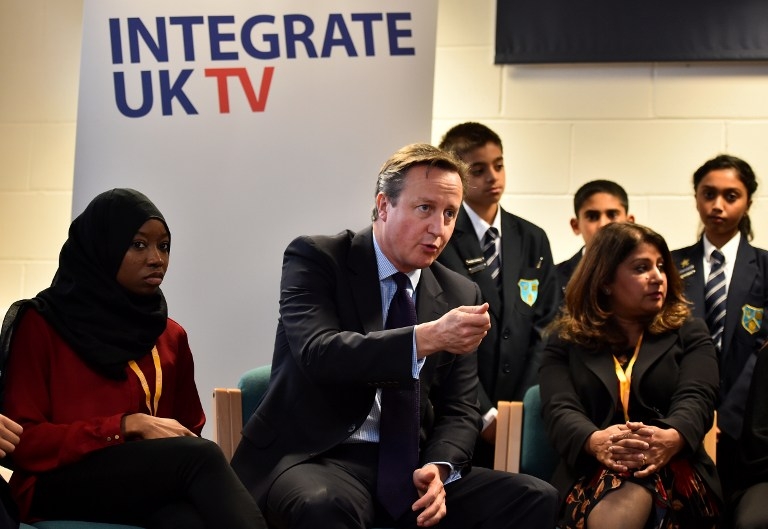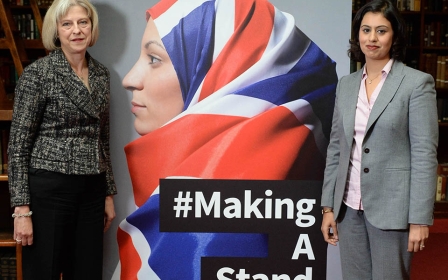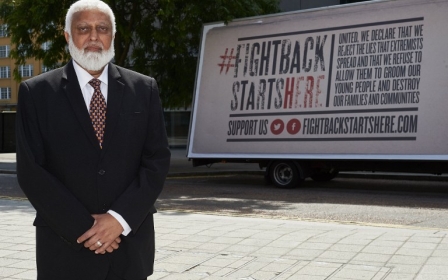UK government facing growing opposition over efforts to outlaw 'Islamist extremism'

The British government is facing mounting political and legal opposition to its efforts to tackle non-violent extremism even as it is expected to put the issue at the heart of its legislative agenda during Wednesday's state opening of parliament.
Middle East Eye understands that the opposition Labour Party is already conducting an internal review of its own counter-extremism policies in consultation with leading Muslim organisations in an effort to distance itself from the governing Conservatives amid growing criticism of the Prevent strategy.
The review, which was ordered by Shadow Home Secretary Andy Burnham, marks a significant shift for Labour, which originally launched Prevent as part of a package of counter-terrorism measures introduced by Tony Blair's government in the aftermath of the 2005 London bombings.
The party has also expressed common cause with the Conservatives in the recent past about the need to fight Islamist extremism, which Prime Minister David Cameron last year called the "struggle of our generation".
“This is the greatest challenge of our age and the prime minister is right to devote his focus to it,” Burnham said in response to the launch of a revamped government counter-extremism strategy last October.
But Burnham signposted a shift in party policy in an interview last month in which he said: "I believe very strongly the government is getting this wrong."
Lawyers also told MEE that any efforts to outlaw "non-violent extremism" could be challenged in the courts on discrimination and freedom of speech grounds.
Details of a new bill reported to include measures to ban groups and silence individuals deemed extremist are expected to be announced on Wednesday in the Queen's Speech, in which the government will set out its priorities and proposed legislation for the forthcoming parliamentary year.
The bill is also reported to include proposals to create a register of extremists, akin to the sex offenders register, that would serve to ban known extremists from working with children or vulnerable people and could be checked by employers.
What is 'extremism'?
But critics point out that a similar bill announced in last year's Queen's Speech has failed to make progress largely because of problems with settling on a legally robust definition of extremism.
Elements of the bill have also been in gestation since at least 2013, when a taskforce set up by Cameron in the aftermath of the killing of British soldier Lee Rigby in Woolwich, south London, suggested that extremism was a "pathway towards terrorism".
In the Prevent strategy, extremism is defined as “vocal or active opposition to fundamental British values, including democracy, the rule of law, individual liberty and mutual respect and tolerance of different faiths and beliefs”.
Yet many lawyers question whether either “extremism” or “fundamental British values” can be defined with sufficient clarity to survive legal scrutiny.
They also point out an apparent contradiction in measures which would both seek to promote values such as free speech and tolerance while also attempting to silence those whose views were deemed extremist but did not promote violence or incite hatred.
“The problem with a term such as extremism is that it must be measured against a normative standard, and since there is no such thing that is conceptually difficult in the first place,” Tasnime Akunjee, a lawyer specialising in terrorism cases, told MEE.
Concerns over the breadth and ambiguity of the definition of extremism have led to alarm that many groups and individuals other than those whom proposed measures are intended to target could also be ensnared by extremism legislation.
Addressing parliament in January, Jim Shannon of Northern Ireland's Democratic Unionist Party said that plans to inspect and regulate madrassas could end up with “Sunday schools, scout troops and even bell-ringing clubs” being investigated, and cited concerns raised by Christian organisations that the extremism bill would amount to “an unprecedented attack on freedom of religion in this country”.
And giving evidence to parliament's home affairs committee in March, Alex Carlile, a former independent reviewer of terrorism legislation, suggested that proposals to outlaw extremism “could be applied to creationists and people who refuse to speak English and who only speak Welsh”.
Threat to political activism
Tayab Ali, a partner at ITN Solicitors, representing the Muslim Brotherhood, told MEE there were serious concerns that extremism legislation could potentially be used to shut down legitimate political activism.
“Designating political activists as extremists and then conflating them with terrorists is fraught with danger and trespasses over important democratic values such as the freedom of thought, religion and expression,” said Ali.
“You are going to be proscribing people on the basis of ideological belief. This should not become another attempt to widen the definition of terrorism by conflating it with extremism and attacking citizens with views and thoughts they are perfectly entitled to hold.”
Both Ali and Akunjee highlighted parallels between efforts to define extremism and long-running legal wrangling in the UK over the definition of terrorism, which Ali said should be “remedied as a priority”.
In a ruling in 2013, the Supreme Court noted that a deliberately broad definition had been adopted in terrorism legislation “to allow for the many disparate forms which terrorism may take,” but with the final decision to prosecute offences left to the discretion of the director of public prosecutions, the UK's top prosecutor.
In doing so, the court ruled, parliament had “abdicated a significant part of its legislative function” to an unelected official and “left citizens unclear as to whether or not their actions or projected actions are liable to be treated by the prosecution authorities as effectively innocent or criminal”.
Any “legislative narrowing” of the definition of terrorism was to be welcomed, the ruling added.
Calls for the government to review its plans to curb non-violent extremism are also supported by academics who suggest that claims of a link between ideology and political violence are “intuitively attractive” but empirically problematic and potentially counter-productive.
“The relationship between the attitudes we hold and the behaviours we carry out is very complex,” Sarah Marsden, a lecturer in radicalisation at Lancaster University, told MEE.
“Just because we hold a set of ideas doesn't mean we act on them and one of the things that is important in a liberal democracy is that ideas are not subject to state interference.
“There is obviously a risk with this bill that by arresting someone on the basis of their expressing very vaguely defined non-violent extremist views you are going to reduce the space for democratic debate and dissent.”
Extremism bill facing major obstacles
The government is already facing intense political scrutiny over its counter-extremism strategy, which is currently the subject of separate inquiries by parliament's home affairs and human rights select committees.
David Anderson, the current independent reviewer of terrorism legislation, has also called for an independent inquiry into Prevent, citing concerns that it is ineffective and discriminatory against Muslims.
Carlile meanwhile told the home affairs committee in March that he believed an extremism bill would be “butchered” in the House of Lords even if it was passed by MPs in the House of Commons.
But the prospect of sustained Labour opposition to the government's proposals means that the bill now looks set to face serious examination in the Commons as well.
MEE understands that Labour researchers have consulted organisations including the Muslim Council of Britain with a view to developing “positive alternatives” to Prevent.
Last month, Burnham also said that Labour would soon launch a cross-party commission to look at Britain's relationship with its Muslim community.
“We’ve got to rethink our whole approach to tackling extremism,” he told Progress magazine. “I don’t think the government’s Prevent agenda is working.”
Labour leader Jeremy Corbyn has also pledged to “look again” at Prevent, telling the Islington Gazette newspaper in his north London constituency earlier this year: “The more I hear about it, the more I want to look at alternative strategies that deal with abuse, hate crime and racism in our society.”
A Labour spokesperson told MEE that the party would be examining the government's plans carefully and would bring forward its own proposals in due course.
“No one wants to see preachers of hate on our streets, or young people groomed into fighting in foreign wars. We therefore need to challenge extremism, but without undermining the British values from which we draw our strength,” the spokesperson said.
“Britain is a place where all are free to express their beliefs as they see fit. For that reason it is a fantastic place to live and, if we choose, a fantastic place to worship. Our comfort with diversity - and common interest in retaining our freedoms of speech, religion and association - help us to unite as a single, strong, community. Our common values are our strength.”
A spokesperson for the Home Office told MEE that the government would not comment on the contents of the Queen's Speech.
New MEE newsletter: Jerusalem Dispatch
Sign up to get the latest insights and analysis on Israel-Palestine, alongside Turkey Unpacked and other MEE newsletters
Middle East Eye delivers independent and unrivalled coverage and analysis of the Middle East, North Africa and beyond. To learn more about republishing this content and the associated fees, please fill out this form. More about MEE can be found here.




